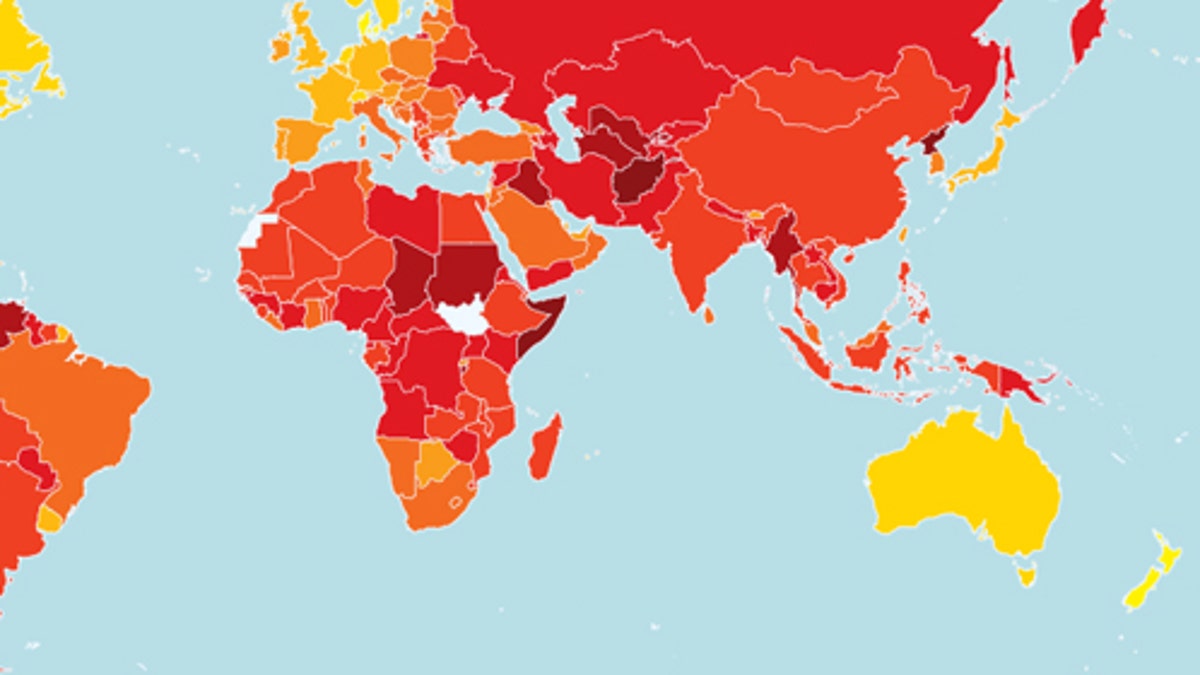
(Transparency International)
Venezuela is the most corrupt nation in Latin America and one of the most crooked countries in the world, according to an NGO annual report.
The Andean nation ranked 165 out of 174 nations on Transparency International’s 2012 Corruption Perception Index. Denmark took the top spot as the least corrupt country in the world, while the most corrupt country, Somalia, ended the list at 174.
Iran (133), war-torn Democratic Republic of the Congo (160) and Libya (160) were all ranked less corrupt than Venezuela.
Corruption is the world’s most talked about problem.
“It is not surprising at all,” said Alejandro Salas, Transparency International’s regional director for the Americas. “It’s a country where the president has so much power over every facet of government.”
Venezuela did improve on its ranking from 2011, where it was ranked 172 out of the 182 countries on Transparency International’s list. The only other Latin American nation deemed more corrupt than Venezuela last year was Haiti, which tied Venezuela at 185 this year.
The country’s continuing low rank on the list signals that not much has changed over the last year, despite many promises made during a hard presidential campaign that saw Chávez defeat rival Henrique Capriles.
As he heads to Cuba to receive follow-up treatment for his battle with cancer, the 58-year old socialist has built up a strong group of faithful followers in all facets of the government since taking office in 1999. However a recession, soaring crime rates, inflation and a massive nationalization push have pushed many people – including Venezuela’s upper classes – away from Chávez’s corner.
“Democracy does not end on the day after the election,” Salas said.
Chávez’s arrival in Cuba puts him the country that is ranked 58 on the list, tied with Turkey and Jordan on the corruption perception index and well ahead of 12 other Latin American nations. Two-thirds of Latin American nation’s fell below the middle of the table, with El Salvador, Panama and Peru all tied at 83, Colombia sat at 94, Argentina 102, Mexico 105, Guatemala and the Dominican Republic at 113, Ecuador 118 and Paraguay 150.
Cuba has remained stable on the list throughout the year mainly in part because while Castro’s regime may be authoritarian; it is also less corrupt because of it. Raúl Castro's reforms – including permitting Cubans to buy homes, own businesses and travel – have also sent a message to the world that change is happening, albeit slowly.
“What’s important in a case like Cuba is that power is very centralized,” Salas said. “There may be some corruption but that depends on the wills of those in power.”
The big news on last year’s list was that Chile was ranked less corrupt than United States. Chile ranked 22 on Transparency International’s 2011 Corruption Perceptions Index, while the U.S. is ranked 24 with Uruguay rounding off the top 25.
In 2012, however, all three countries jumped up with the U.S. landing at 19 and Chile and Uruguay coming in a tie for the 20th spot.
“What all these countries have in common are that their institutions – police, justice – are respected and people have trust in them,” Salas said.
Both Southern Cone nations have been relatively stable for the last decade, but Chile still faces turmoil due to the ongoing student protests over education reform and also demonstrations against a number of hydroelectric dam projects.
Uruguay has recently been in the headlines for its proposal to legalize marijuana and have the government control the sale of the drug. Uruguayan President José Mujica, who previously announced plans to grow up to 150 hectares of marijuana for sale to users, said that his government hopes to eliminate the black market trade in pot – and related violence - by implementing this measure.
“We are losing the battle against drugs and crime in South America. Somebody has to be the first,” Mujica said, according to the U.K. newspaper the Daily Mail.
Despite many of its nations ranking on the lower end of Transparency Internationals index, Latin America remained relatively stable in its overall positioning. Many Eurozone nations affected by the financial and economic crisis dropped on the list as did countries throughout the Arab World affected by uprisings.
“Corruption is the world’s most talked about problem,” stated Cobus de Swardt, Managing Director of Transparency International. “The world’s leading economies should lead by example, making sure that their institutions are fully transparent and their leaders are held accountable. This is crucial since their institutions play a significant role in preventing corruption from flourishing globally.”
